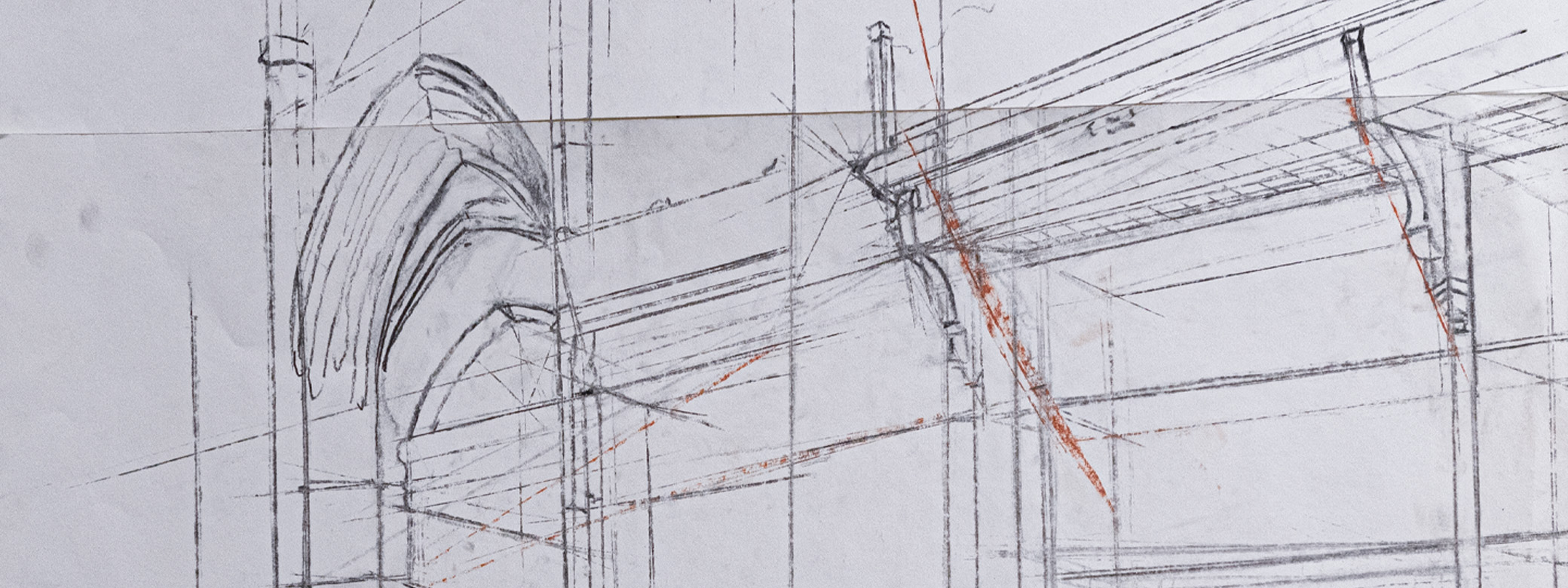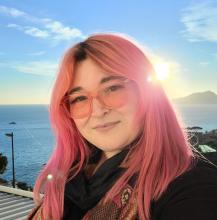Tiffany-Ashton Gatsby received a Bachelor of Arts degree in Art in June 2022, with departmental honors and a concentration in Interdisciplinary Visual Art. They had a second major in Anthropology, specializing in Medical Anthropology and Global Health, and a Diversity minor. In 2021, Gatsby was selected as a member of the Husky 100. Just prior to graduation, they were announced as a UW President’s Medalist.
Gatsby was the Division of Art’s undergraduate speaker for the School’s 2022 Graduation Celebration. Below is the text of their speech.
Good morning everyone! We’ve got a long day ahead of us, so maybe we need a second to stretch and shake it out. Feel free to play me off the stage if I’m taking too much time up here. For those of you who don’t know me — or only know me as the person with the bright pink hair — I’m Tiffany-Ashton Gatsby, and I use they/she pronouns. For those of you who do know me, I’m sure you got my crash course backstory within the first few conversations. I have Multiple Sclerosis, I have a kiddo who’s a UW alum and works for UW… and I’m sure I’ve announced my GPA. In fact, that might be the first thing out of my mouth. I was talking about first impressions with my friend Brianne, and she said the first thing they thought about me was that I must have something to prove. And she’s right! I do have something to prove. I’ve been fighting imposter syndrome every day since I enrolled in community college. But here I am on this stage talking to you today.
My path here was anything but straightforward. When I was little, I wanted to be a doctor. Well, a plastics and reconstructive surgeon. I also wanted to be an academy award winning actor and director. So filmmaking by night, chop-chop by day. No one doubted that I was going to do great things. But circumstances changed in high school. I ended up dropping out. I lived on the street for a while and tried to follow around the Grateful Dead. I came back home got married and became a teen parent. Fast forward fifteen years and I’m in a successful career. I get diagnosed with MS. My self-identity is completely tied to that career. But a few years later, I have an exacerbation of MS that lands me in the hospital. I came out barely able to walk, suffering from chronic pain, complex PTSD, and agoraphobia, afraid to be more than ten minutes away from an emergency room. My career was over. I didn’t know who I was anymore or what value I had to offer. I ended up turning to art to deal with the trauma and loss. Biomedicine failed me but art provided a powerful emotional transformation that allowed me to heal and cope with what was going on.
My kiddo was at UW Tacoma at the time and majoring in Politics, Philosophy, and Economics, and during a heated debate one day said to me, “Don’t be such a utilitarian” — I had no clue what they meant. That was when I knew I needed to go back to school. Cards on the table, I still don’t know what utilitarianism means without googling it, but I didn’t take any philosophy courses.
So, at 40 I enrolled at Seattle Central and took an intro to drawing class. I knew art was the answer for me. For the past five years, I haven’t had one quarter without some sort of art class or activity. But it wasn’t until I came here to UW that I really found my home and my people in the School. I think Liz Copland in advising was the first person I met. She was incredibly encouraging about my work, took me on a tour and really laid out a plan of what the School had to offer. Liz gave me the scoop on all the study abroad programs, wrote me recommendation letters when I needed them, and helped me find art scholarships when I first transferred in. She was interested in me as a person, not just a random student ID number.
I’m a double major in medical anthropology and global health and IVA (Interdisciplinary Visual Art). Anyone else out there a double major? One thing that I’ve spoken to so many of my classmates about is the connections we make here in the School compared to other departments. Back when we were on Zoom, I’d sometimes be the only student with my camera on, no one speaking up. But not in Art not on Zoom. Most everyone had their cameras open. Most people were willing to share and speak. In fact, a lot of us, myself included, don’t stop talking. Which is a good thing. There’s nothing worse than being in a class where no one is participating. One of my classmates said that here in the School we’re able to find people with the same mindset, and we’re able to make connections with people that think similarly to us. And I think that’s where we build such a strong foundation that prepares us to go out in the world and take on whatever challenges are ahead of us, whether we stay working in the field of art or not.
While the art courses here provide us with direction and technical skills, they provide much more than instruction in the visual arts. Whitney Lynn encourages students to be independent thinkers and never wants to put constraints on our work. “Just do your work” she always says. But we’re expected to defend our opinions and choices, and we dig deep in conversations that touch on all areas of academia and our lives. You leave Whitney’s class with more than you came with. You can’t possibly get through a class without writing down the names of 12 different artists, two films, and a great book to read. If I look at the notes section in my phone and there’s a random name in there with no explanation, I know it’s something Whitney mentioned.
I’ve found more returning adult students and non-traditional students here in the School. While there are many of us who found our way to art accidentally, so many of us came here intentionally and hoping to find a career in the arts. Timea Tihanyi spent time working with us on developing our personal websites and resumes to make sure we’re ready to present ourselves to the world when we leave UW. Which is in about 4 more hours. Timea is tough, but she pushes us to research our ideas and move forward with a solid plan.
I’m leaving the School to pursue a doctoral program here at UW in Sociocultural Anthropology specializing in Medical Anthropology, where I’ll continue the research what I’ve done in my time here as an undergrad, exploring healing through art in the queer-disabled community. I’m basically leaving art to go study art. Whitney was the one who encouraged me to incorporate my journey as a patient into my art, which then led to a selfie-collage project in my honors thesis made with a dozen interlocutors that I turned into a short film and 62-page paper presented at four academic conferences last year. My research examines how socially engaged art meant for public installation can combat traumas experienced as the result of biomedical care and provide emotional and community-level healing for queer-disabled individuals by pushing back against marginalization and promoting visibility. Before I came to the School, I didn’t know what the heck socially engaged, installation, or site-specific art even was. And now I’m going to be writing a dissertation on it… in medical anthropology! So, for the parents out there that worried when their kids said they were getting an art degree, don’t worry about it. We’re getting so much more than that.
If there’s one thing I hope you remember from knowing me, it’s that it is NEVER too late to change your path and pursue your passion. Twenty years from now if you don’t like what you’re doing with your life, change it! Go back to school. Get another degree. Put more art out there in the world. I’m 45 and this is just the beginning. And this is just the beginning for everyone here. The future holds a thousand more beginnings for each of us. So go out and grab your next beginning.

